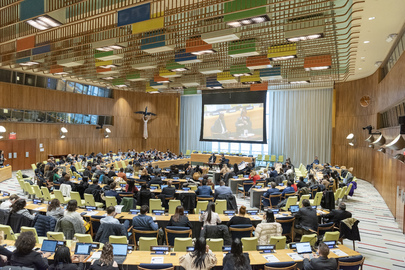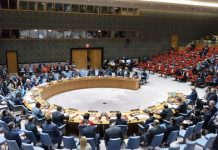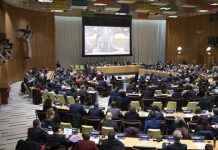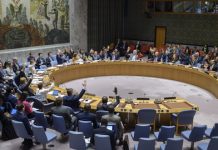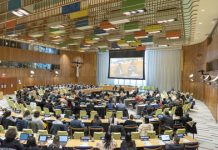“I always had the painful experience of seeing the other children go to school with their rucksacks,” says 14-year-old Zénabou. “It was tormenting because even though I was burning with a desire to find out what happened in the schools where these children went every morning, I realised very early on that it was a system that wasn’t made for me because I was different.”
For many children with disabilities, the doors to education have remained firmly shut, leaving them with few opportunities and little hope for the future. Yet, in the Central African Republic (CAR) today, children like Zénabou are finally receiving the adapted support and educational opportunities that they deserve thanks to a new inclusive education pilot initiative.
The programme is providing essential resources like learning materials, mobility aids, and specialized classes to learn Braille and sign language; creating a network of community support for families; and integrating children with disabilities into local schools.
Zénabou, a deaf teenager in the Central African Republic, in her classroom.
A Door Opens
Zénabou sits at the desk in her classroom, workbook in front of her, and surrounded by classmates. She smiles as she watches her teacher write something on the blackboard. It might look like an ordinary scene to someone passing by but to the fourteen-year-old and other children with disabilities like her, this is an extraordinary moment.
Before she enrolled in classes, Zénabou would stay at home most of the day, helping her mom with household chores. Her hours were filled with washing dishes, cleaning clothes and fetching water for her family.
“Going to school was something I’d never hoped for,” she signs. “The day I went to school for the first time, I suddenly realised that I wasn’t the only one in this situation. Seeing more than 30 deaf people in the same place was astonishing!”
Through a multi-year investment, specialised classes for deaf and visually impaired children are held in Bambari, CAR, within ordinary primary schools. There, children like Zénabou who have often never even stepped foot in school are taught to read, write and count, and learn Braille or sign language. These crucial skills unlock a world of learning for them.
Before attending school, Zénabou could barely communicate with those around her. Her parents saw few opportunities for her future. Illiterate themselves, they wanted more for their daughter, but considering her disability, they had no hope. But everything changed when she was given the access, resources and support to learn.
Zénabou in her classroom
“My daughter Zénabou is now able to assert herself as a person, despite the communication barriers caused by the fact that she is deaf,” says Zénabou’s Father. “I’m now optimistic about Zénabou’s future and I know she’s going to succeed!”
Education Crisis in CAR
The Central African Republic is one of the toughest places in the world to be a child. Conflict, displacement and instability are undermining efforts for peaceful development, putting children and adolescents at serious risk. Years of violence have contributed to the breakdown of what were already limited services. Access to healthcare, livelihood opportunities and education is very limited or non-existent in large parts of the country.
The country’s education system is grappling with significant challenges, particularly for children with disabilities. Prolonged conflicts have devastated the educational infrastructure, leaving a million children and adolescents out of school. This crisis disproportionately affects children with disabilities, who face compounded barriers to education due to stigma surrounding disabilities and limited access to specialized support.
Addressing these challenges requires concerted efforts to rebuild educational infrastructure, promote inclusive teaching practices, and combat societal stigma to ensure that all children have access to an inclusive, quality education.
Zénabou with her sister, Aziza
Inclusive education in the Central African Republic
- Working with organizations that represent persons with disabilities is key to ensuring their participation in decision-making, as outlined in the Convention on the Rights of Persons with Disabilities. It has also been recognized to be necessary for social change, to promote autonomy and to ensure the empowerment of persons with disabilities.
- This groundbreaking initiative is funded by Education Cannot Wait (ECW), the global fund for education in emergencies and protracted crises in the United Nations
- It is supported by the UN children’s agency UNICEF, partners like Humanity and Inclusion and national organizations, including the Centre d’Alphabétisation et de Formation en Braille pour les Aveugles en Centrafrique’ and the Association Nationale des Déficients Auditifs de Centrafrique.
Source of original article: United Nations (news.un.org). Photo credit: UN. The content of this article does not necessarily reflect the views or opinion of Global Diaspora News (www.globaldiasporanews.net).
To submit your press release: (https://www.globaldiasporanews.com/pr).
To advertise on Global Diaspora News: (www.globaldiasporanews.com/ads).
Sign up to Global Diaspora News newsletter (https://www.globaldiasporanews.com/newsletter/) to start receiving updates and opportunities directly in your email inbox for free.


